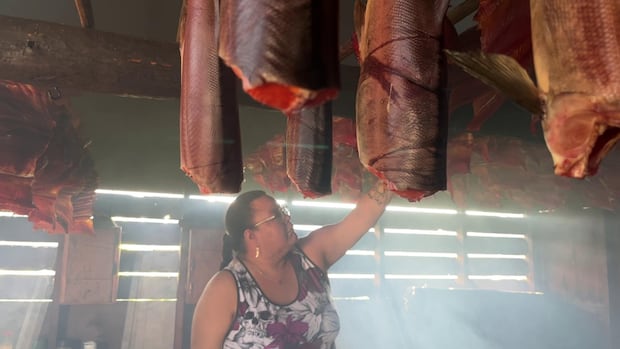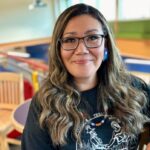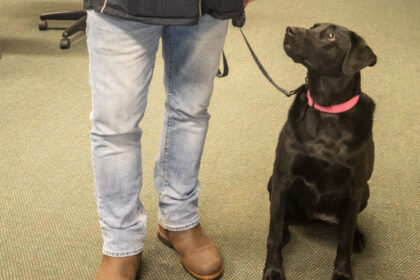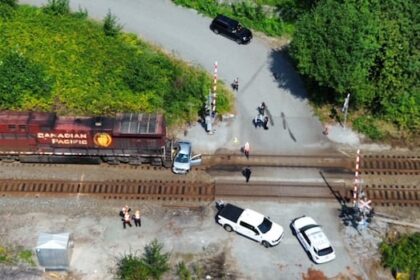British ColumbiaFor the first time in decades, smokehouses are filled with hundreds of fish in the village of Tachie, about 195 kilometres west of Prince George, B.C. The community is celebrating both the return of salmon and the opportunity to pass down cultural teachings.The community is processing a record return of Fraser River salmonHanna Petersen · CBC News · Posted: Sep 03, 2025 7:00 AM EDT | Last Updated: 6 hours agoGeorgina Alexis examines the salmon in her mother-in-law’s smokehouse in the village of Tachie, about 195 kilometres west of Prince George, B.C. (Hanna Petersen/CBC)In Tachie, a village of the Tl’azt’en Nation, sockeye salmon are coming back to their spawning grounds in full force.For the first time in decades, the village’s smokehouses are filled with hundreds of fish and the community, on the northwest shore of Stuart Lake, about 195 kilometres west of Prince George, B.C., is celebrating both a return of salmon and the opportunity to pass down cultural teachings. “We’re just excited for the community to be able to have their smokehouses running and going and flowing and, you know, and everybody practising our culture again,” said Darren Haskell, executive director of the Tl’azt’en Nation and resident of the Fraser Salmon Management Council. WATCH | Salmon returns bring back cultural practices: Return of salmon cause for celebration in the village of TachieOn Stuart Lake, in the village of Tachie west of Prince George, the smokehouses are filled with salmon. It’s the first time in decades the village has seen this many sockeye returns. As CBC’s Hanna Petersen reports, the community is celebrating a return of both salmon and culture. Tachie is located on the northwest shore of Stuart Lake, about 195 kilometres west of Prince George, B.C.Haskell says the so-called early Stuart salmon run saw sockeye returns of more than 700,000 which is the largest it’s been since 1993 and even more salmon are expected in the late Stuart salmon run from the end of August into early September. Louisa Alexis sits outside her smokehouse near the shore of Stuart Lake to take a break from tending to the salmon. (Hanna Petersen/CBC)Last year’s salmon, which was caught elsewhere, had to be trucked into the community and distributed to members, he said.”Which isn’t our culture and isn’t our tradition. We don’t want our children to learn that fish come from the back of a truck.” But this year is notably different.”The overall mood in the community has just been uplifted because because of this return, everybody just seems to be in greater spirits,” Haskell said.Passing down traditionOne of the community’s smokehouses belongs to Elder Margaret Mattess, who has been busy preparing salmon and sharing traditional ways with her whole family. Last year, she was only able to smoke 15 fish, but this year her smokehouse received more than 200 salmon in just one week. “This is what our ancestors did and we’re still doing it right now. We’re carrying it on and we’re still passing it on to other people,” she said. Georgina Alexis and her four-year-old daughter walk to her mother Louisa’s smokehouse to tend to the drying salmon. (Hanna Petersen/CBC)It is a lot of work to keep the smokehouse going long enough to process that many fish, Mattess said, as the smoke needs constant attention. So her sisters and other family members have come to help. “It’s been wonderful because you know, in recent years there’s been such a shortage that not only did we not get our fish, but we didn’t have the social time together because we didn’t need to [maintain the smoke house],” said Mattess’ sister Brenda Bodner. “When there’s lots of fish, it takes lots of bodies to take care of the fish and the nets and everything,” she said. Honouring the salmon Mattess’ son Don says he hopes to pass down the knowledge of preparing and smoking salmon to his four-year-old daughter.Margaret Mattess’ smokehouse has seen over 200 salmon this season. (Hanna Petersen/CBC)”My grandparents showed me, then my parents showed me, and now I’m showing my little girl the same things,” he said. Louisa Alexis is a residential school survivor, who just started learning how to prepare salmon 10 years ago. She says this year’s abundance of fish is an answered prayer and she’s grateful to be practicing her culture with her daughter Georgina. Margaret Mattess holds dried salmon outside of her smokehouse in Tachie. (Hanna Petersen/CBC)”I feel like a woman again! A real Dakelh woman! Everyone up here is very happy with the salmon coming back,” she said. “I think about all the ancestors when I’m in the smokehouse. It gives me peace and calmness and pride knowing I’m doing the same thing they’re doing.” While the overall mood in the community is one of celebration, Haskell says they are also deeply honouring the salmon’s return.ABOUT THE AUTHORHanna Petersen is a reporter for CBC News, working out of the Prince George, B.C., bureau. You can email her at hanna.petersen@cbc.ca.
Thursday, 5 Feb 2026
Canada – The Illusion
Search
Have an existing account?
Sign In
© 2022 Foxiz News Network. Ruby Design Company. All Rights Reserved.
You May also Like
- More News:
- history
- Standing Bear Network
- John Gonzalez
- ᐊᔭᐦᑊ ayahp — It happened
- Creation
- Beneath the Water
- Olympic gold medal
- Jim Thorpe
- type O blood
- the bringer of life
- Raven
- Wás’agi
- NoiseCat
- 'Sugarcane'
- The rivers still sing
- ᑲᓂᐸᐏᐟ ᒪᐢᑿ
- ᐅᑳᐤ okâw — We remember
- ᐊᓂᓈᐯᐃᐧᐣ aninâpêwin — Truth
- This is what it means to be human.
- Nokoma











